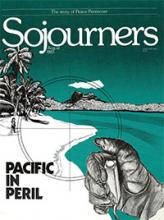The following is taken from a Sojourners interview with Bernie Keldermans, a native of Palau, who is leader of the Save Palau organization and director of science curriculum and development for the Palau Board of Education. Keldermans is one of the many Palauans actively working against the U.S.-sponsored Compact of Free Association, which would end U.S. control of Palau under the U.N. trusteeship agreement but allow for more extensive U.S. military activity on the islands. She is also active in the Catholic Church. --The Editors
I am from the island of Palau, which is on the western end of Micronesia. Our islands have been colonized three different times: by the Spaniards in 1668, the Germans in 1899, and the Japanese after World War I. Then in 1947, after World War II, we were turned over to the United States by the United Nations and became a U.S. trust territory.
When the Americans came, we felt good because they said they were going to save the islands from colonialism. We believed them, and for 30-some years they taught us ideas of democracy and freedom.
Negotiation of the Compact of Free Association started in 1969, but 10 years later, in 1979, we hadn't seen the proposed agreement. We had heard of negotiations taking place in Honolulu, Hawaii, but these meetings were all very secluded. We kept asking why we, the common people, were not part of the negotiations. If the negotiations would affect us, then why didn't they ask the people what they wanted to negotiate?
Read the Full Article

